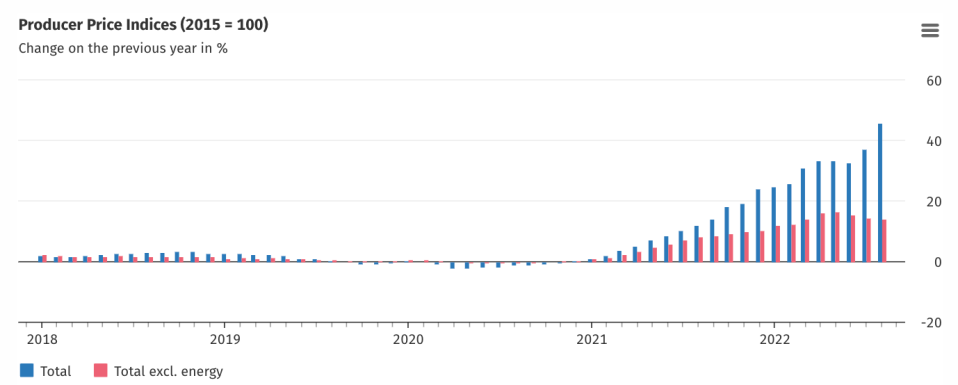German business costs accelerate at quickest pace on record

German business costs have soared at the fastest rate ever in a sign that more financial woe is set to be heaped on consumers.
Input prices, known as the producer price index, surged 45.8 per cent last month, according to Germany’s statistics agency.
The record jump was driven by a near tripling in electricity prices. The rate was far above analysts’ expectations.
Europe’s largest economy is wilting under the weight of Russia’s invasion of Ukraine lighting a rocket under energy prices.
German annual input price inflation

Moscow has cut off gas flows through the Nord Stream I pipeline to carry out maintenance works, it claims.
Experts have warned flows are unlikely to be switched back on unless Western countries roll back sanctions on Russia.
Germany is heavily reliant on its industrial sector, a massive consumer of gas and electricity, to generate output.
Higher energy prices are forcing industrial firms to cut back unprofitably production, prompting economists to warn the country is headed for a sharp recession this year, hitting the entire eurozone economy.
European electricity prices are linked to gas prices due to the bloc employing a “marginal cost” production system.
Costs are set by the final producer, which typically charges high prices due to them using a mix of inputs that are costly.
Poor storage capacity and weaker renewable generation has forced less efficient firms to produce energy at a higher cost to meet demand, pushing up electricity and gas prices on the Continent.
The fresh figures underscore the severity of inflationary pressures sweeping through the German economy.
Consumers are already shouldering a 8.8 per cent rise in the cost of living, the sharpest increase in a generation.
Experts warned consumer inflation will reach record levels, driven by firms passing on swelling costs through higher prices to protect margins.
The European Central Bank this month hiked interest rates 75 basis points, the steepest move since it was created in 1999, to tame roaring inflation.